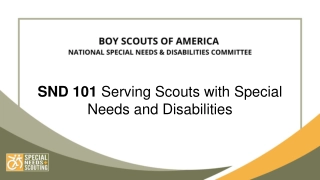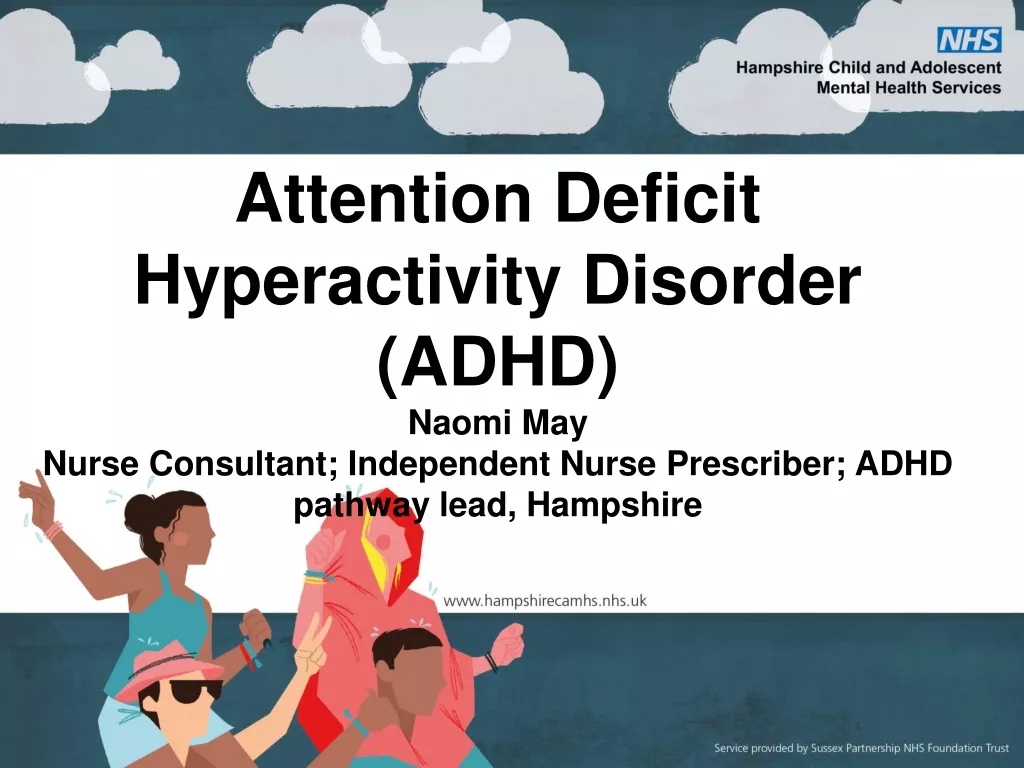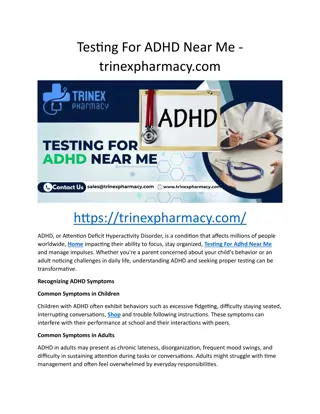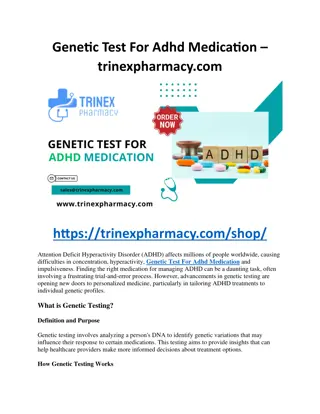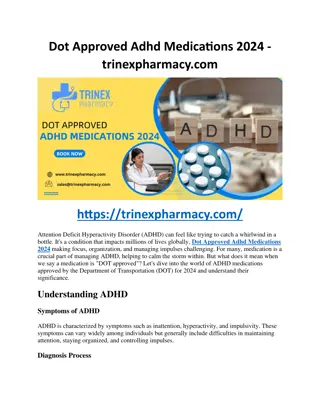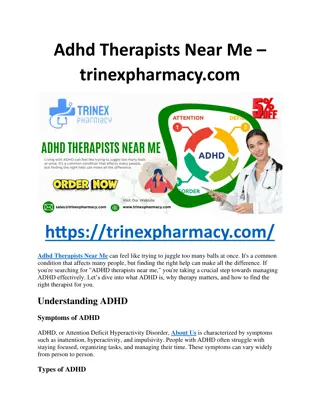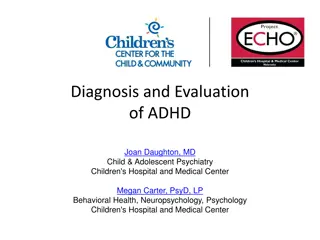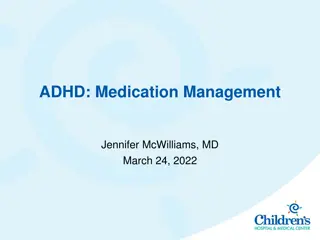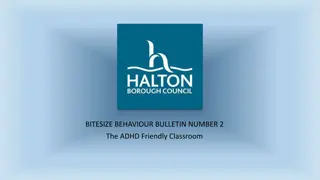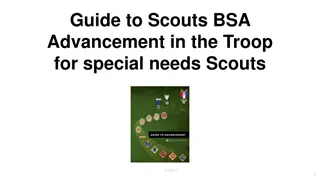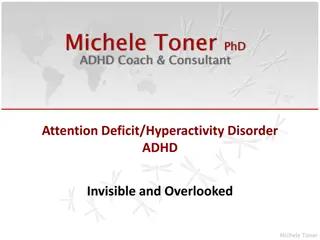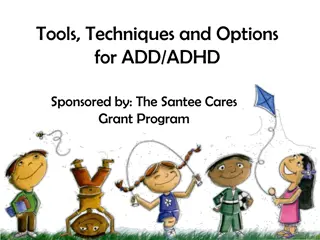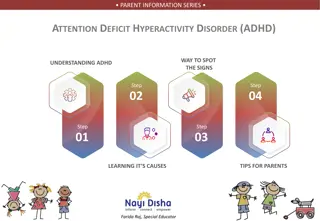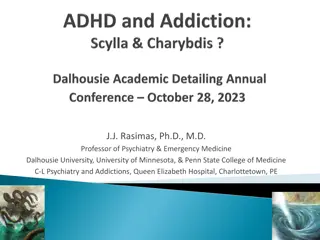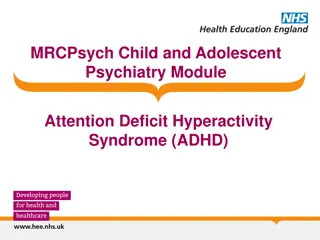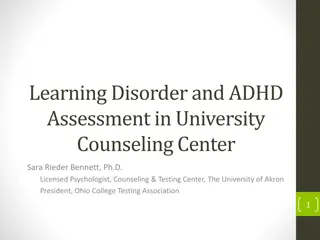Understanding ADHD in Scouts: Tips for Leaders
This presentation highlights Attention-Deficit/Hyperactivity Disorder (ADHD) in scouting, focusing on the DSM-5 criteria, characteristics of ADHD, and tips for leaders to support scouts with ADHD. It emphasizes strengths, challenges, medication management, and successful strategies for working with parents and scouts.
Download Presentation

Please find below an Image/Link to download the presentation.
The content on the website is provided AS IS for your information and personal use only. It may not be sold, licensed, or shared on other websites without obtaining consent from the author. Download presentation by click this link. If you encounter any issues during the download, it is possible that the publisher has removed the file from their server.
E N D
Presentation Transcript
ADHD CED 714 Expiration Date This presentation is not to be used after Dec. 31, 2019. Obtain an updated version at www.scouting.org/disabilitiesawareness.aspx
Attention-Deficit/Hyperactivity Disorder The DSM - 5 diagnostic criteria for ADHD is: A persistent pattern of inattention and/or hyperactivity/impulsivity that interferes with functioning or development as characterized by: -Inattention -Hyperactivity and impulsivity
Characteristics of ADHD Impulsivity Hyperactivity Inattention The Tip of the Iceberg Hidden below the surface
Characteristics of ADHD Impulsivity Inattention Hyperactivity Physiological Factors Coexisting Conditions Delayed Social Maturity Weak Executive Functioning Impaired Sense of Time Low Frustration Tolerance Sleep Not Learning Easily From Rewards and Punishment Disturbance Learning Difficulties Hidden below the surface
Focus on the Scouts Strengths! Energetic Bright Creative Enthusiastic Flexible Inquisitive
TIP #1 Getting to know your Scout. Have a conversation. Scout s Strengths Scout s Challenges How the Scout learns best
Leaders Need to Know Important information about every Scout Equipment/Assistive Technology needs Diagnosis/Health issues Medications Allergies Things to avoid
TIP #2 Work with parents on medications. Regular medication schedule-why? Responsibility of prescription medication- who? If state laws are more limiting, they must be followed.
TIP #3 Work with parents on tips for success. sensitivity issues? sleeping issues? issues with large groups?
TIP #4 Time Management State your expectations Give a time warning Break up directions
TIP #5 Complement the Scout whenever you find a genuine opportunity. Ignore minor inappropriate behavior if it is not dangerous or disruptive. Try to sandwich correction between two positive comments Give clear and concise limits
TIP #6 Be aware of early warning signs Fidgety behavior may indicate the Scout is losing impulse control. Schedule breaks. Use stations or movement for participation. Give the Scout a break token to use. Give a non-verbal or proximity signal to the Scout to focus.
TIP #7 When you must redirect a Scout, Speak in a calm voice. Say, Tell me what happened? Never publicly humiliate a Scout. Keep your cool.
TIP #8 When a Scout is starting to become more impulsive or aggressive Use a yellow card/red card system for all Scouts playing. Cooling off zone Provide an alternate activity
TIP #9 Have Expectations for all Scouts Expect the Scout with ADHD to follow the same rules as other Scouts. ADHD is NOT an excuse for uncontrolled behavior.
TIP #10 Offer opportunities for purposeful movement 2013 Leading cheers Performing in skits Assisting with demonstrations Teaching outdoor skills to younger Scouts
Leader actions that can trigger responses Remember to use the Golden Rule Beware of some reactions that can have negative responses Some techniques can also Backfire
Scouting Is a Great Program for Youth With ADHD
Through systematic Explanation, interactive Demonstration, and Guided practice, Scouting Enables Scouts with ADHD to discover and develop their unique strengths and interests.
Resources: Scouting.org http://www.scouting.org/scoutsource/boyscouts/thebuildingblo cksofscouting/disabilities.aspx Children and Adults with Attention Deficit/Hyperactivity Disorder http://chadd.org Attention Deficit Disorder Association http://www.add.org Scouting Magazine http://scoutingmagazine.org/2013/12/help-scouts-adhd-succeed-without- hurting-anyones-feelings/


